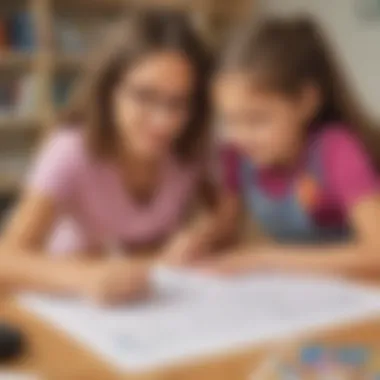Comprehensive Guide to Word Search Words for Children


Intro
Word search puzzles are not just simple games to pass the time. They are powerful educational tools that provide significant cognitive benefits for children. These puzzles challenge kids to search for and recognize words, boosting their vocabulary and promoting critical thinking. In this guide, we will explore the various aspects of word search puzzles, including how to create them, their educational value, and practical tips for integrating them into learning environments.
Interactive Learning Games
Incorporating word search puzzles into a wider framework of interactive learning games can enhance the educational experience for children. These games engage young minds and foster both fun and learning.
Popular Games
Several games have become popular due to their educational impact. Some of them include:
- Scrabble: Enhances vocabulary and spelling.
- Hangman: Improves word recognition and spelling.
- Boggle: Encourages quick thinking and word formation.
Description of top educational games
Each game has unique features that aid in learning. For instance, Scrabble encourages team play but focuses heavily on vocabulary, while Boggle provides a fast-paced environment that challenges children to think on their feet.
Benefits of playing educational games for kids' cognitive development
The benefits of educational games extend beyond mere entertainment. They:
- Promote cognitive skills such as memory and attention.
- Encourage teamwork and cooperation.
- Foster a positive attitude towards learning.
Game Reviews
When it comes to game reviews, these various educational games stand out. They offer different gameplay experiences that cater to unique learning styles.
Comparison of gameplay and learning outcomes
Ultimately, the effectiveness of these educational games lies in their mechanics. For example, while Scrabble focuses on individual word creation, games like Pictionary emphasize visual representation. Both contribute to vocabulary enhancement but through different means.
Educational Topics
Word search puzzles can be adapted to catch a broader range of educational subjects. This makes them versatile tools for learning.
Compilation of articles covering various subjects like math, science, languages, etc.
Including subject-specific words in puzzles can help students learn key terms. For example, a word search focused on scientific terms can solidify a student’s grasp of basic concepts in biology or chemistry.
Importance of interdisciplinary learning for holistic development
Interdisciplinary learning encourages connections between subjects. This approach can foster a more profound understanding and appreciation for how different fields relate.
Tips and Tricks
To make the most from word search puzzles, parents and educators can utilize certain strategies.
Practical tips for parents and educators to enhance children's learning journey
- Create puzzles based on current learning topics.
- Encourage children to explain the words they find.
- Set challenges, such as finding words within a time limit.
Strategies for making learning fun and engaging
- Integrate multimedia resources, like apps and online tools, to generate puzzles.
- Consider themed puzzles during holidays or special events.
Creative DIY Projects
Creating DIY projects related to word searches can encourage creativity among kids.
Step-by-Step Guides
Parents can easily create their own word search puzzles using simple guides. These often involve selecting a theme, compiling a word list, and arranging the words in a grid.
Benefits of hands-on activities for children's cognitive and motor skills
Hands-on activities help strengthen motor skills while reinforcing concepts learned through word searches. They actively involve children in the educational process.
Craft Ideas
There are various craft ideas that can complement learning through word searches. From creating themed decorations to designing custom puzzles, the options are limitless.


Importance of artistic expression in children's development
Engaging in artistic activities fosters a creative mindset, enhances problem-solving skills, and builds confidence.
Utilizing word searches as an educational tool allows children to explore language and develop important cognitive skills.
Understanding Word Search Puzzles
Understanding word search puzzles is essential in recognizing their potential as educational tools. These puzzles go beyond simple entertainment; they facilitate deeper engagement with language and contribute to cognitive development in children. Parents, teachers, and caregivers should acknowledge the multi-faceted benefits that arise from such activities, especially as children navigate their learning journeys.
Definition and Purpose
Word search puzzles consist of a grid filled with letters, where words are hidden in various orientations. The objective is to locate and circle or highlight these words. The design of a word search is often thematic, allowing for a focused vocabulary expansion.
The primary purpose of these puzzles is to enhance language skills while providing enjoyable learning experiences. Each word found helps reinforce spelling, pronunciation, and comprehension. This makes them particularly valuable in educational settings, where engaging materials can enhance the learning experience.
History of Word Searches
The origins of word search puzzles trace back to the 1960s. The first puzzle was created by Norman E. Gibat and published in a California newspaper, aptly titled "Word Search." This innovative format caught on quickly, transcending into educational realms and recreational activities.
Since then, word searches have evolved in design and complexity. They are now widely used in classrooms and homes, adapted to cater to different age groups and learning levels. Educators have incorporated them in various subjects to support vocabulary development and promote critical thinking.
Overall, the understanding of word search puzzles is foundational to appreciating their role in vocabulary enhancement and cognitive growth. This knowledge opens avenues for practical applications in various educational settings.
Cognitive Benefits of Word Searches
Word searches are more than just entertaining games for children. They serve as unique educational tools that offer a variety of cognitive benefits. Understanding these benefits can help educators and parents utilize word searches effectively to promote learning and development. This section will explore how word searches enhance vocabulary, improve pattern recognition, and boost memory retention.
Enhancing Vocabulary Skills
Engaging in word search puzzles can significantly support vocabulary growth in children. When children search for words, they are exposed to new terms and phrases. This exposure helps to reinforce spelling and pronunciation. Moreover, children are encouraged to understand the meaning of words to successfully locate them within the puzzle.
Research shows that repeated practice leads to better retention of newly learned vocabulary. By incorporating a themed approach in word searches, such as focusing on animals, seasons, or professions, parents and educators can create a context that makes learning even more effective. Children often remember words better when they can associate them with a specific context or theme.
Improving Pattern Recognition
Pattern recognition is an essential cognitive skill. It allows children to make sense of information and solve problems. Word searches require individuals to scan a grid for words based on their shape and spelling. This process helps children to sharpen their ability to identify patterns within letters.
Through regular engagement with word searches, children can develop a more advanced understanding of how words are structured. They learn to recognize common prefixes, suffixes, and word formations. This understanding is crucial in developing strong reading skills. Therefore, word searches can serve as a practical strategy for fostering cognitive development in this area.
Boosting Memory Retention
Memory retention is another significant benefit of word searches. As children search for words, they actively engage in the material and reinforce their memory. The act of hunting for words requires concentration and focus, which can enhance short and long-term memory.
Encouraging children to revisit puzzles or create their own can further aid in reinforcing their memory of specific words. Playing word searches regularly helps to strengthen neuronal connections in the brain, promoting advanced memory development. In this manner, what may seem like a simple puzzle is actually a robust exercise for the mind.
"Regular engagement with word searches not only boosts vocabulary but is also crucial for children's cognitive development."
In summary, the cognitive benefits of word searches are vital for children's learning journeys. By enhancing vocabulary skills, improving pattern recognition, and boosting memory retention, these puzzles provide a grounded approach to enriching cognitive abilities in a fun context.
Creating Effective Word Searches
Creating word searches is not just an enjoyable activity but also a powerful educational tool that can help children develop various cognitive skills. This section will detail the key elements of crafting effective word searches that engage learners and enhance their vocabulary. The process goes beyond simply putting words in a grid; it involves thoughtful consideration of themes, vocabulary, and puzzle design to ensure that children get the most out of the experience.
Choosing Appropriate Themes
The theme of a word search significantly influences its effectiveness. By selecting themes that resonate with children's interests or current learning topics, you can make the activity more appealing. For instance, if children are learning about animals, a word search with animal names will likely engage them more than a generic list of words.
Some popular themes include:
- Animals: Helps reinforce vocabulary related to different species.
- Seasons: Encourages discussions around weather, activities, and holidays.
- Shapes and Colors: Introduces basic concepts in geometry and art.
- Space or Dinosaurs: Appeals to kids' innate curiosity about the world.
When creating a word search, think about what your child or students are excited about. This relevance not only captures attention but can lead to deeper discussions and learning.
Selecting Age-Appropriate Vocabulary
Another crucial element is the vocabulary used in the puzzles. Selecting age-appropriate words ensures that children find the task challenging but not overwhelming. For younger children, stick to simple, commonly used words. In contrast, older children might benefit from more complex vocabulary, including synonyms or more specialized terms related to the theme.
You can categorize vocabulary into different levels:
- Basic Vocabulary: Common nouns and verbs suitable for early learners.
- Intermediate Vocabulary: Slightly difficult words that may be used in school subjects.
- Advanced Vocabulary: Challenging words for older students capable of critical thinking.


When children successfully find words, it can greatly enhance their confidence and willingness to tackle new topics.
Designing the Puzzle Grid
Once you have selected the theme and vocabulary, the next step is designing the puzzle grid. A well-designed grid is necessary for a functional and enjoyable word search. There are two main considerations in this step: the grid size and word placement.
- Grid Size: Choose a grid that is appropriate for the number of words. A small grid may become crowded with words, making it hard for children to spot them. A larger grid provides more space and a greater challenge, which can entertain older children.
- Word Placement: Vary the direction of the words. Words can be placed horizontally, vertically, diagonally, and even backward. This variation keeps the activity interesting. However, balance is important; if every word is placed diagonally, it may frustrate younger solvers.
Additionally, be strategic in the arrangement. Placing words in close proximity can help solve a word if they intuitively search nearby.
Remember that effective puzzles encourage problem-solving and promote learning. Good design cultivates an environment where children can thrive.
By focusing on these aspects when creating word searches, you enhance the learning experience, promote vocabulary development, and make the activity enjoyable for children. Each step in the process is essential for achieving a well-rounded educational tool.
Integrating Word Searches into Learning
Integrating word searches into learning activities serves multiple purposes. First, it enhances engagement by making learning fun. Children often find traditional learning methods less appealing. However, puzzles like word searches can transform the learning experience. Second, it allows for the reinforcement of vocabulary in an enjoyable way. When children search for words, they get familiar with spelling and context, which smoothens their language skills over time.
Teachers and parents should consider the various elements involved in effective integration. The choice of words is very important. Selecting words that align with a specific lesson or theme enhances the relevance of the activity. Additionally, it encourages deeper connections between the words and the subject matter. Another aspect to think about is the format of the puzzle itself. While traditional grids work, adventuresome designs can stimulate interest.
Classroom Applications
In the classroom, word searches can serve as diverse educational tools. Teachers can introduce them as warm-up exercises to activate students' prior knowledge related to a topic. For instance, if the lesson is about animals, a word search filled with names like "elephant," "tiger," and "kangaroo" can precede further discussions. This builds a solid foundation for the lesson.
Moreover, they can be used as a fun assessment method. Students enjoy completing puzzles and may find it easier to recall terms during a word search compared to other assessment styles.
Some classroom applications include:
- Themed lesson word searches: Directly related to current curriculum topics.
- Group competitions: Friendly competition can motivate students to engage and learn together.
- End-of-term review puzzles: These can summarize key vocabulary from several lessons.
At-Home Learning Activities
Word searches can also be effectively utilized in home learning. Parents can create custom puzzles addressing their children’s interests. By doing this, they promote engagement and learning simultaneously. They can align these puzzles to their child’s school subjects or personal hobbies, ensuring that the activity resonates better with the child.
At home, parents can turn word searches into team activities. Sitting together while working on them can create a family bonding experience. This collaborative effort fosters a sense of teamwork and communication skills.
Ideas for at-home learning activities include:
- Word hunt challenges: Parents can ask children to find words related to a specific theme in a time frame to add excitement.
- Puzzle creation sessions: Encourage kids to create their own puzzles, enhancing their spelling and creativity.
- Digital word searches: Utilizing online resources could add a modern twist.
Integrating word searches into both classroom and home settings offers children a unique method to engage with vocabulary and concepts, strengthening their educational journey in the process.
Tips for Maximizing Educational Impact
Maximizing the educational impact of word search puzzles is crucial for achieving their full potential as a learning tool. While these puzzles can be enjoyable, focusing on specific strategies enhances the educational value of the activity. Such measures ensure that children engage with the material, fostering a deeper understanding of vocabulary, spelling, and cognitive skills.
To effectively leverage word searches in an educational context, it is important to address considerations like the ages of students, the complexity of words, and the learning objectives. When used thoughtfully, word searches can prompt discussions, stimulate curiosity, and create interactive learning environments that benefit both educators and students.
Effective word searches can transform simple fun into meaningful learning experiences.
Setting Clear Objectives
Establishing clear objectives is a foundational step to ensure that the word searches serve their educational purpose. By defining what the child should learn or achieve by completing a puzzle, the educator can choose or create word searches that align with curriculum goals.
These objectives can relate to vocabulary enhancement, spelling accuracy, or topic knowledge. For example, when introducing a new subject, a word search containing terms related to that subject can reinforce learning. Additionally, clear objectives help assess student progress, as completion of the puzzle becomes a measurable outcome of their learning experience.
Here are some tips for setting effective objectives:
- Identify specific vocabulary words that relate to lessons.
- Link the objectives to broader educational goals, such as improving reading comprehension or language skills.
- Ensure that the objectives remain age-appropriate, challenging yet achievable for children.
Encouraging Collaborative Learning
Encouraging collaborative learning in word search activities can amplify their educational impact. When children work together on these puzzles, they not only share ideas but also expose themselves to diverse perspectives and strategies. This type of engagement develops essential social skills and promotes teamwork.
Group activities can involve peer discussions, where children explain their approaches and discover different problem-solving techniques. Additionally, collaborating can reduce frustration, as they can help each other when finding words becomes challenging.
To implement collaborative learning effectively, consider the following:
- Organize children into small groups, accommodating different learning styles and abilities.
- Assign roles, such as leader, writer, or checker, to foster responsibility within the group.
- Create a supportive environment where children feel comfortable sharing and communicating ideas.
Applying these principles will not only make word searches more enjoyable but more educational, leading to a richer learning experience.


Variations of Word Searches
Word searches can take many forms, and their variations play a crucial role in keeping the activity fresh and engaging. This subsection considers different types of word searches that can enhance learning and maintain the interest of children. Adapting the format can make these puzzles appealing, allowing for differences in purpose and context.
Themed Word Searches
Themed word searches provide a targeted approach to learning vocabulary. They focus on a specific subject, such as animals, seasons, or holidays. By choosing particular themes, educators and parents can align the word search with ongoing lessons or interests. This can reinforce the new vocabulary being learned in a fun manner.
When designing a themed word search, the following points can be useful:
- Choose Relevant Themes: Select a theme that connects to the child's current curriculum or interests.
- Include Varied Difficulty Levels: Cater to different age groups by including a mix of common and challenging words.
- Promote Discussion: Use the theme as a jumping-off point for discussions about the topic. This can deepen understanding and engaging more deeply with the material.
A themed word search not only aids in vocabulary acquisition but also enhances background knowledge about the theme itself.
Word Searches with Clues
Integrating clues into word searches adds another layer of challenge and engagement for children. These puzzles provide hints or definitions alongside the words they need to find. This encourages children to think critically about the vocabulary and reinforces their understanding.
Here are some considerations for creating word searches with clues:
- Clear Clue Design: Ensure that the clues are straightforward and directly related to the words.
- Mix of Clue Types: Use a combination of definitions, synonyms, or examples to maintain variety and interest.
- Encourage Reflection: After completing the search, discuss the clues with the child. This promotes deeper learning and retention.
By requiring children to engage with the hints, these types of word searches can serve dual educational purposes: discovering new words while thinking critically about their meanings.
Interactive Digital Word Searches
The evolution of technology has allowed for the creation of interactive digital word searches. These online platforms offer a dynamic approach to puzzles, capturing children's attention in today's digital landscape. Digital word searches often come with added features such as timed challenges or printable options.
Some benefits of interactive digital word searches include:
- Immediate Feedback: Children receive instant feedback on their progress, which can motivate them to continue and improve.
- Varied Gameplay: Many platforms provide different game modes, keeping the experience exciting and engaging.
- Accessibility: Digital versions can often be accessed more easily, allowing for play on various devices, which can be beneficial for children’s learning outside the classroom.
As technology plays a more significant role in education, incorporating interactive digital word searches can augment traditional learning methods, ensuring they meet the needs of a tech-savvy generation.
Word searches are not just games; they are useful tools for cognitive development, vocab expansion, and critical thinking.
Assessment and Feedback
Assessment and feedback play critical roles in the effective integration of word search puzzles within educational contexts. The use of word searches can be valuable, but measuring their impact and providing guidance are essential for maximizing the educational benefits. Assessment allows educators and caregivers to track progress in vocabulary acquisition and pattern recognition, while feedback aids in refining learning strategies and enhancing engagement.
Evaluating Learning Outcomes
Evaluating learning outcomes from word search puzzles involves several key factors. Firstly, observing how well children recognize and recall the words they find is a direct measure of their progress. This can be done through informal conversations or quizzes. It allows educators to grasp the effectiveness of vocabulary lists used in the puzzles. Moreover, understanding which words are frequently missed may point to areas needing more focus.
Additionally, children can be asked to use newly learned words in sentences after completion of a puzzle. This practice ensures that vocabulary is not just memorized but understood in context. By integrating such evaluations, teachers can adapt their approaches, ensuring that each child’s learning journey is positively impacted.
Providing Constructive Feedback
Providing constructive feedback is crucial after assessing a child's performance with word searches. Feedback should be clear and direct, addressing both strengths and weaknesses. For instance, if a child consistently struggles with specific words, a teacher should highlight this, while praising their success in identifying others.
This type of feedback helps to build confidence and encourages continued effort. Caregivers and educators can also suggest additional activities, such as using similar words in different contexts, to reinforce learning. Here are several tips for effective feedback:
- Be specific: Point out exact areas of success or struggle.
- Encourage progress: Emphasize improvement over time, fostering motivation.
- Be supportive: Maintain a positive tone to encourage further participation in similar activities.
Constructive feedback creates a dialogue between the child and the educator, leading to a richer learning experience. As a result, children begin to understand that learning is a process, and they can take ownership of their vocabulary development through word searches.
Final Thoughts on Word Searches
In the context of education, word searches represent a valuable tool for enhancing cognitive development in children. They offer a unique combination of fun and educational benefits. As caregivers and educators utilize these puzzles, it is important to recognize their potential to enrich the learning process. Encouraging children to engage with words in a playful manner contributes not only to their vocabulary growth but also to crucial cognitive skills such as memory and critical thinking.
Future of Word Search Puzzles in Education
The future of word search puzzles in educational settings looks promising. As technology continues to advance, there is increasing potential for integrating digital tools within traditional learning environments. This can include interactive platforms where children can create and solve word searches online. Not only does this foster engagement, but it also allows for immediate feedback and tracking of progress, which are essential for effective learning.
Furthermore, educators are discovering the value of personalized learning experiences. Custom word searches tailored to students' interests and reading levels can heighten motivation and interest in language. As curriculum designers begin to incorporate word searches into broader educational strategies, they are becoming an integral part of language arts education.
"Word searches not only entertain but educate, bridging gaps in vocabulary acquisition and cognitive development."
Encouraging Lifelong Learning through Puzzles
The incorporation of word searches into a child's daily routine can promote a culture of lifelong learning. When children engage with these puzzles, they develop a habit of seeking out new words and meanings, which can extend beyond the puzzles themselves. This curiosity can lead to improved literacy skills and a more profound appreciation for language.
Additionally, as children grow, they can transition from simple word searches to more complex language puzzles. This progression not only sustains their interest but also continuously challenges their cognitive abilities. Adults can also partake in this activity, creating intergenerational bonding experiences that emphasize the joy of learning together.
To facilitate this, parents and educators can encourage collaborative word search activities that allow children to work together, sharing knowledge and strategies. This not only enhances learning but also builds communication and teamwork skills, which are essential in both academic and social settings.
In summary, the role of word searches in education is multifaceted. They not only serve as fun activities but also as powerful tools for enhancing vocabulary, encouraging a love of words, and laying the groundwork for lifelong learning.















